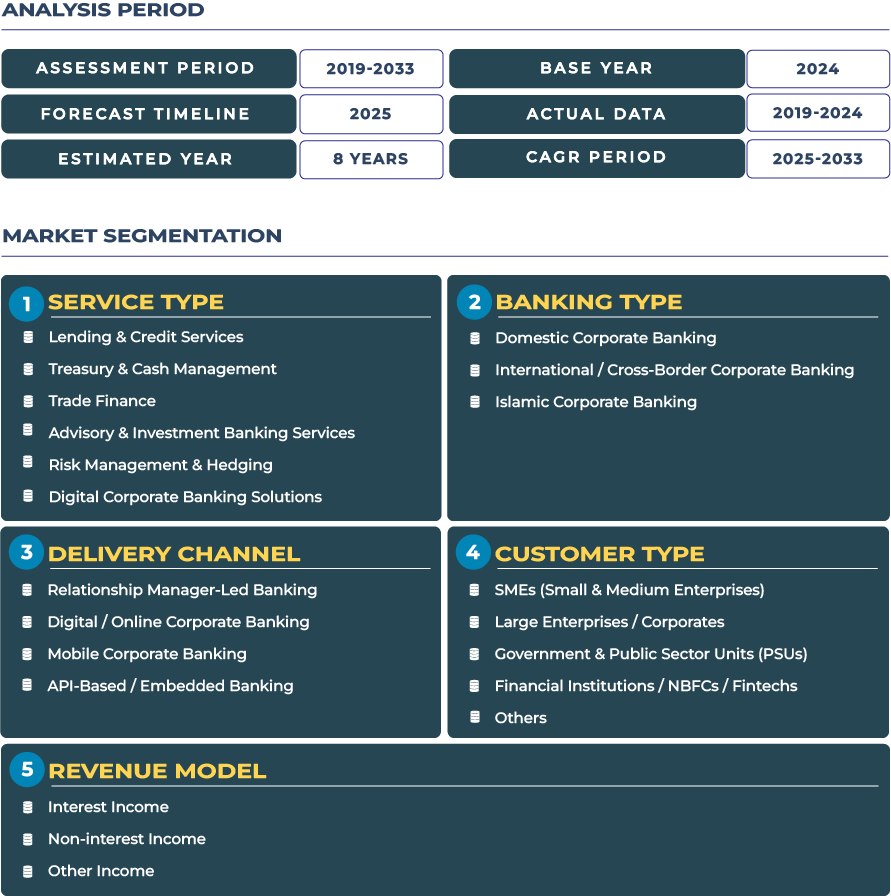Digital Payment Acceleration Reshaping Corporate Banking Dynamics in the Philippines
The Philippines is undergoing a structural shift in how enterprises manage liquidity, financing, and transactional flows as corporate banks prioritize digital payment ecosystems for business clients and SMEs. The market is being reshaped by QR-based enterprise platforms, API-driven cash automation tools, and digital treasury services offered by both incumbents and neo-banks. Corporate clients operating in sectors such as BPOs, manufacturing, logistics, and wholesale trade increasingly demand real-time payments, automated receivables, and financing built into transaction platforms. This shift is redefining the Philippines corporate banking market beyond traditional credit lines and branch-led services.
Note:* The market size refers to the total revenue generated by banks through interest income, non-interest income, and other ancillary sources.
The sector is projected to expand from USD 14.4 billion in 2025 to USD 26.6 billion by 2033, reflecting a CAGR of 7.9%, supported by strong SME formalization, fast-growing BPO-linked payroll ecosystems, and digital-first treasury workflows. While geopolitical tensions and post-pandemic currency volatility have introduced risk elements, the acceleration in digital payment frameworks, such as the national push for cashless systems, has created a more scalable environment for enterprise financial services. The combination of fintech integration, central bank digitalization mandates, and export cluster liquidity needs is reshaping how banks structure products and partnerships across the archipelago.
Remittance-Linked Enterprises and Fintech Collaboration Drive Market Momentum
A key driver of the Philippines corporate banking industry is the liquidity management demand from remittance-dependent conglomerates and BPO multinationals. Corporates operating regional payroll, supplier, and receivables networks require structured cash management tools and working capital solutions. Fintech-led corporate collections offer real-time settlement capabilities and API integrations into enterprise ERPs, helping banks extend treasury and payments coverage beyond traditional corporate hubs such as Metro Manila and Cebu.
SME suppliers supporting export sectors like electronics, agribusiness, and garments represent another layer of growth. These firms require revolving credit facilities, invoice financing, and trade finance instruments to address payment cycles tied to overseas buyers. Digital corporate banking solutions streamline access to credit scoring and trade documentation workflows, reducing dependence on manual processes. Further, the explosive rise in fintech-based digital payments positions banks to integrate payments-as-a-service models into their treasury architectures.
Persistent Infrastructure and Regulatory Gaps Remain Structural Constraints
Despite strong digital momentum, growth is constrained by fragmented payments infrastructure across island provinces. Interbank settlements and corporate transfer rails often face interoperability lags outside major commercial centers. Informal SMEs, operating without structured financial records or digital transaction histories, limit adoption of formal credit and treasury services. Currency risk volatility, linked partly to high remittance flows and FX imbalances, complicates trade finance and receivables hedging for exporters and distributors.
Additionally, regional disparities in digital readiness challenge corporate banks as they deploy mobile-based treasury platforms and automated payment gateways. Banks face onboarding and compliance friction when extending credit to informal suppliers within manufacturing value chains. While regulatory modernization initiatives from the Bangko Sentral ng Pilipinas aim to streamline digital KYC and transaction authentication, legacy systems continue to slow adoption in provincial markets.
Corporate eWallets, Supplier Finance, and Integrated Payroll Solutions Shape New Demand
Corporate eWallet adoption is scaling rapidly across enterprises engaged in distribution, freight services, and retail networks. These platforms support real-time disbursements, automated accounting entries, and batch payment scheduling. Supplier financing instruments are growing in export clusters, particularly in Cavite, Laguna, and Davao, where electronics and agrifood exporters seek dynamic working capital solutions. Banks are bundling advisory and trade documentation support into digital trade finance platforms to streamline ownership transfer, customs mandates, and currency settlements.
Banks are also integrating payroll management with embedded HR solutions to retain high-volume corporate accounts, particularly within the BPO and IT-enabled services sector. This bundling of compensation processing, benefits payments, and liquidity services creates higher retention and cross-sell potential. In addition, remittance-linked FX hedging solutions present new opportunities as firms seek to mitigate exchange rate fluctuations impacting import costs and supplier settlements.
Strategic Shifts by Local and International Players Define Competitive Differentiation
The corporate banking landscape is increasingly shaped by agile strategies from both domestic and foreign banks. BDO Unibank has advanced its corporate digital onboarding and supplier finance offerings to capture export-oriented SMEs. Land Bank of the Philippines, a government financial institution, continues expanding credit programs for agribusiness corporates through integrated digital loan channels. International banks such as HSBC Philippines are focusing on receivables financing and cash pooling solutions for multinational enterprises.
Recent developments include integration of remittance-linked FX hedge products for corporates to manage dollar-peso fluctuations and bundled payroll-plus-cash-management services tailored for outsourcing firms. These product strategies aim to improve account retention and reduce transaction leakage to fintech competitors. Supplier finance programs bolstered by partnerships with large exporters are supporting working capital cycles and embedding banks deeper into SME value chains.







